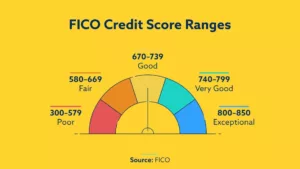Credit scores measure behavior in terms of how well you manage credit and debt. Knowing the consequences of certain actions may help keep you on track with your credit scores.
There are several components to credit scores but a few key components have the most impact. It only takes a few actions for a credit score to lower 50 points, 100 points, or even more. If at all possible, avoid these actions:
What Causes Low Credit Scores
1. Missing the payment due date
The number one factor in how credit reporting agencies determine your credit score is your payment history. If you constantly pay your bills late, you’re hurting your credit score. The late payment notation is added to your credit reports when your payment becomes more than 30 days late. Late payments can stay on credit reports for 7 years.
Note: Late payments aren’t reported to the credit bureau until after 30 days. So if you’re under 30 days late, you can make the payment along with any late fee to avoid the late payment reporting to your credit report or credit score.
2. Missing payments altogether
In keeping with number 1 above, if you miss the next payment, the 30 day late payment is updated to 60 days, and so on in 30-day increments until your account is charged-off after 180 days. When that delinquent payment becomes 180 days late it is now a “key derogatory” and has a significant negative affect on your credit history and scores. Examples of derogatory accounts include collections, charge-offs, foreclosures and repossessions. Even settling a debt for a lesser amount is considered a serious negative and defined as derogatory as well. Both delinquent accounts and derogatory accounts will lower credit scores and hurt your ability to qualify for credit or other services. Any delinquencies or collections on your credit will cause a lender to take a second look.
3. Using too much of your available credit
Another action that lowers your credit score is to always be near your credit limit. A very common reason for a low credit score is an increased utilization ratio. Utilization ratio measures how much of your credit you are using in relation to your total available credit. For example, if you had 2 credit cards each with a $2,000 credit limit ($5,000 available credit) and you charged $1000 on each ($2,000 balance), you’d have a 50% credit utilization ratio ($2,000 / $5,000 = 50%).
In general, the lower this ratio, the better for your score. People with low credit utilization tend to have the highest credit scores.
4. Too many credit inquiries
If you have had a number of hard inquiries on your credit in the past few months, this will negatively affect your credit score. It will signal to the credit reporting agency that you’re a credit risk. Applying for new credit accounts can cause your credit score to score. Each time you apply for new credit, an “inquiry” is added to your credit report. Each of these inquiries can have a small impact on your credit score, and several inquiries in a short time frame will have a greater impact on your score than a single inquiry.
If you have engaged in any of these actions your credit score can be recovered and here is how:
Ways to counteract low credit scores
Start paying bills on time.</h3>
Payment history is the number one factor impacting your credit scores. Stay on top of bills at all costs. If you cannot pay on time contact your creditor immediately to work out some type of payment plan that involves late payments not being reported to the credit bureaus.
Resolve Negative Accounts.
If you have derogatory accounts like collections or charge-offs contact the company to see if anything can be done to resolve and delete the accounts from your credit reports. Utilize pay for delete strategies for collection accounts, challenge charge-offs reporting inaccurate information and request goodwill adjustments from creditors that reported late payments.
Add Healthy, Positive Accounts.
Make sure you have several positive accounts reporting and apply for new credit only as needed.
Reduce Account Balances.
If you have credit card accounts make sure you only utilize 10% or less of your available credit limits. This will help raise your credit scores. Keep balances at those low levels by not charging credit cards to their limit and making sure you pay down new charges.

















